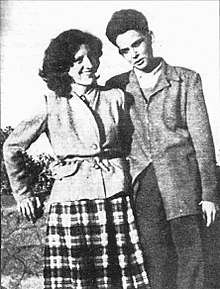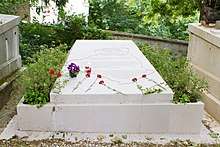Maurice Audin
Maurice Audin (14 February 1932 – after 11 June 1957) was a French mathematics assistant at the University of Algiers, a member of the Algerian Communist Party and an activist in the anticolonialist cause, who died under torture by the French state during the Battle of Algiers.[1]
Maurice Audin | |
|---|---|
 Maurice and Josette Audin | |
| Born | 14 February 1932 |
| Died | after 11 June 1957 |
| Citizenship | French |
| Alma mater | University of Algiers |
| Scientific career | |
| Doctoral advisor | Laurent Schwartz |
In the centre of Algiers, beside the university, the intersection of streets bearing the names of several other heroes of the Algerian Revolution is called the Place Maurice-Audin.[2]
The Audin affair

During the Battle of Algiers, Maurice Audin was arrested at his home on 11 June 1957, by Captain Devis, Lieutenant Philippe Erulin and several soldiers of the First Parachute Regiment of the French Army. He was taken to the Villa Susini in the fashionable neighborhood of El Biar for interrogation.
A trap was installed in the apartment of the Audin family and Henri Alleg, the former editor of the Alger républicain, was arrested there the next day.
Doctor Georges Hadjadj later admitted that, under torture, he had given Audin's name to men working for Paul Aussaresses, following threats that his wife would be raped.[3]
Audin was last seen alive by Henri Alleg, one day after his arrest. Alleg had just been arrested, and the paratroopers attempted to intimidate him by showing Audin, who had been tortured and was confused. Pressed to tell Alleg how torture would feel, he said "it is tough, Henri" (c'est dur, Henri). Alleg described the events in La Question; he also mentioned later hearing a prisoner dragged away and gunshots, that he assumed were Audin's summary execution.[4]
Audin's wife and their three children never received any further information about him. According to Pierre Vidal-Naquet, who wrote in May 1958, in the first edition of L'affaire Audin, that escape was impossible, Maurice Audin died under torture on 21 June 1957, at the hands of Lieutenant André Charbonnier (a graduate of Saint-Cyr who was nicknamed "the doctor" because he liked to use a scalpel on his victims[5]), under the orders of the General Jacques Massu. According to the French Army, Maurice Audin tried to escape by jumping from a jeep during a transfer. However, in November 1960, Charbonnier told Vidal-Naquet that he had strangled Audin and buried the body in Fort l’Empereur in El Biar.[3]
By July 1957, some newspapers started to discuss "the Audin affair" and, on 2 December 1957, the defence in absentia of his doctoral thesis, On linear equations in a vector space, chaired by Laurent Schwartz, aroused indignation among certain academics against the situation in Algeria.
"Audin committees" were created to publicise the issue and arouse public opinion against the practice of torture in Algeria.
A judicial inquiry was initiated following a complaint from his wife. At the request of the lawyers for Madame Josette Audin, the case was transferred in Rennes in April 1959; it lasted until April 1962 when it was closed for lack of evidence. Moreover, on 22 March 1962, an amnesty had been decreed for "activities within the framework of the operations for the enforcement of law and order directed against the Algerian insurrection".
When the case was closed, Madame Audin's lawyers appealed to the supreme court of appeal. Their appeal was rejected in 1966. The body of Maurice Audin not having been found, a death certificate was issued by a court in Algiers on 1 June 1963, a judgment which was recognized in France on 27 May 1966.
In 2001, Madame Audin issued a new complaint, calling her husband's death a crime against humanity.[6]
In June 2007, fifty years after her husband's disappearance, Madame Audin wrote to Nicolas Sarkozy, the then newly elected French president, asking him that the mystery of her husband's disappearance be cleared up and that France assume its responsibility in the affair.
In January 2009, Michèle Audin, the daughter of Maurice Audin, herself a mathematician, publicly declined the French Legion d'Honneur, which had been awarded for her work. As a motivation for her refusal, she cited the lack of response from the French government to her mother's letter.
In September 2018, president Emmanuel Macron admitted that Maurice Audin died under torture by French government in Algeria.[1][7]
See also
- Torture during the Algerian War
- Censorship in France
References
- Chrisafis, Angelique (September 13, 2018). "France admits systematic torture during Algeria war for first time". The Guardian. Retrieved September 13, 2018.
- Talbott, John (Spring 1976). "The Strange Death of Maurice Audin". Virginia Quarterly Review.
- Meziani, Abdelhakim (2001-09-02). "Ces aveux qui dérangent". L'Expression. Archived from the original on 2009-01-08.
- Tresilian, David (2001-01-11). "France confronts its past". Al Ahram Weekly. Archived from the original on 2012-03-12.
- Merchet, Jean-Dominique (2000-12-12). "Général basses œuvres". Algeria-Watch. Archived from the original on 2014-03-28.
- "La disparition de Maurice Audin" [The disappearance of Maurice Audin]. FR3. 2001-06-27.
-
Adam Nossiter (2018-09-13). "French Soldiers Tortured Algerians, Macron Admits 6 Decades Later". The New York Times.
The French president said he 'recognized, in the name of the French Republic, that Maurice Audin was tortured and then executed, or tortured to death, by soldiers who arrested him at his home.'
Further reading
- General Paul Aussaresses, The Battle of the Casbah: Terrorism and Counter-Terrorism in Algeria, 1955-1957. (New York: Enigma Books, 2010) ISBN 978-1-929631-30-8.
External links
- ldh-toulon.net – letters of Josette Audin and Michèle Audin to the French president (in French).